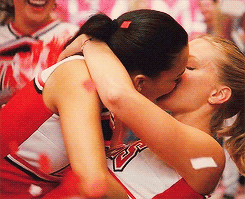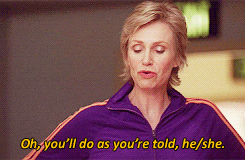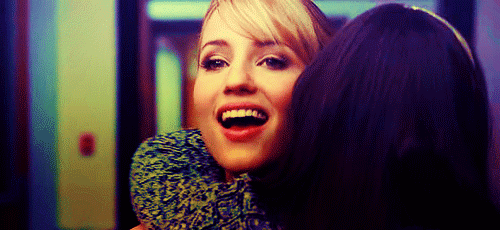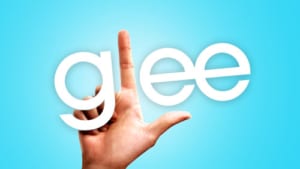Okay, so I know I’ve said in the past that season 3 was my favorite. And I can absolutely see why I remembered it that way, because this was the season where I jumped into the fandom headfirst. This was the season where Brittana shared their first kiss. It was also the season that gave us the Troubletones. No matter how absurdly problematic her storyline was, I will always have a soft spot in the corner of my blackened, cynical little grinch heart for punk!Quinn and the personal journey she goes through this season.

For me, a lesbian desperately looking for validation via a reflection of herself in the media, Glee season 3 was a goldmine of content that I had been so sorely deprived of in mainstream culture. It’s not that Glee is the first piece of validating media I’d ever seen in my life, not by far. If it was even a tiny bit gay, you bet your bottom I had watched it. But Glee was one of the first mainstream shows to be overtly gay, and on top of that it wasn’t just The Gays that watched it. Everyone watched Glee. Probably a fourth of my classmates watched Glee. My middle aged boss watched Glee. My freaking parents watched Glee (and I’ll come back to that detail later.) It’s really difficult to impart how big of a cultural phenomenon it was if you didn’t live through it or participate in it.
But a few key things had begun to change for the weird little show choir show that could. The first was that with larger audiences and the success of the iTunes tie-in sales, the show was under a lot of pressure to fit round-pegged songs into square-pegged story holes. While I can say that it worked reasonably well about 75% of the time, occasionally you would get some weirdness like Blaine and his brother singing a breakup song to each other.
I know that context matters, Glee, but that doesn’t make it any less weird that you went there.
With the increased pressure to churn out iTunes singles also came an increase in the number of songs per episode, which meant that the writing had to bend over backwards to tell a story in the spaces between the Top 40 hits. The show already strained a little in season 2 to mold its plot around the musical numbers, but in season 3 things got even rougher around the edges. There is still a (mostly) coherent plot here, and one that is filled to the brim with exactly the kind of ridiculous drama that we’d come to expect from Glee. But season 3 is the first time when the narrative starts to get really wobbly. It didn’t help one bit that the narrative took nosedives into problematic territory for the sake of drama.
If I broke down every single problematic story decision made this season, we’d be here all day. I don’t have the time to go through this television show episode by episode. Let me live. But I can give you a short list. There’s Quinn Fabray’s early season descent into madness that involved attempting to get Beth (her biological daughter) taken away from her adoptive mother Shelby and Shelby and Puck’s amazingly gross, inappropriate, and unnecessary affair. Then you have everything that has to do with Will Shuester’s weirdly codependent relationship with the Glee kids. Not to mention whatever they were going for with Rory the Irish Exchange Student’s plot, doubling down on the Asian stereotypes with Tina and Mike at every turn, the aftermath of Santana’s outing, and anything that had to do with Unique.
Yes, that is the short list.
So why was it my favorite season? Well, a lot of it begins and ends with the canonization of Brittana and the story arc of my favorite lesbian, Santana Lopez. Like the rest of the season, her arc was defined by some impossibly high highs and some embarrassingly low lows. But there was a reason I loved it, despite how deeply flawed it is, and I believe that deserves to be unpacked in detail.
Let’s start with her outing. It’s no secret that fans were angry about how Santana’s outing was handled. Hell, we’re still angry about it five years later. The short version is that in retaliation for yet another one of Santana’s legendary drag sessions, Finn comes back at her by literally shouting, “Hey Santana! Why don’t you just come out of the closet?” in the middle of a crowded hallway during a passing period.
Finn continues to come after her about this, even as she is walking away, saying that the reason she’s so mean to everyone is because she’s constantly tearing herself down. He says she’s afraid to admit that she’s in love with Brittany and that Brittany might not love her back. He tops it off by calling Santana a coward. If you’re making a ‘yikes’ face at your screen right now, me too buddy. Even just writing about it makes me cringe. Sidenote, the fact that he outed Brittany too is not ever really addressed. Swing and a miss there, Glee. Though it’s one of many, so it often gets lost in the crowd.
Back to Santana. There are dozens of students walking around in the background and lingering nearby who hear the entire conversation. One of these students passes this information onto a political candidate running against Sue Sylvester in a local election. The end result is that this political candidate puts Santana in a smear ad for Sue, explicitly naming Santana as a lesbian. The ad implies that this is due to Sue’s influence and/or responsibility, effectively outing Santana to the entire voting district (even more yikes).
Will and Sue notify Santana, and Sue explicitly apologizes, citing her scorched earth political techniques as the root cause of the awful turn of events. While this is objectively true in one aspect, the real reason it happened was because Finn Hudson didn’t stop to think for a second that maybe, possibly, there was a reason that Santana was afraid to come out. He made the choice for her because his feelings were hurt and he knew this was the only way to get back at her. If you are viewing this turn of events from a perspective other than one that mirrors Santana’s, it’s possible to have a little sympathy for Finn lashing out in hurt and anger. But I don’t have that perspective, so you’ll only get spitfire and brimstone from me.
Devastated, Santana runs crying out of the office. She hasn’t even had the chance to talk to her parents yet but now the whole county knows. But of course this is Glee, and the show must always go on, no matter what else is happening in your life. And the show that happens is arguably the best song in the entire series’ run:
After the musical number, Finn is whispering to a classmate, and Santana has an understandably inflammatory reaction to it when she assumes he’s whispering about her. She then slaps him across the face so hard it’s hard to say if that was a stage slap or not. I gotta be honest, that impact felt real. Or maybe I just wanted it to be.

Santana is then pulled into the principal’s office for slapping him. Because apparently McKinley has a zero tolerance policy for physical violence that only counts when it’s a lesbian rightfully smacking the shit out of the boy who outed her to the greater Lima area code. Finn falls on the sword for her, and then…. I’m really going to need to pull back from giving a play-by-play at this point, because my vision starts to get a little blurry from rage when I think too much about what happens next. All you need to know is that the episode where her outing is ‘resolved’ by the Glee club is called “I Kissed A Girl”. It’s every bit the disaster you’re thinking it is based on the title.
At this point, I’m sure you’re wondering why I’m defending this show. The answer is… well, partly because it’s a product of its time. As I’ve said in the previous two retrospectives, this was how the show humanized queer stories to a straight audience. I also mentioned that my parents watched Glee, and I was there when they watched this episode. Up until this point, the fact that I was a lesbian was deeply controversial in my family, but in a ‘below the surface’ kind of way. We never talked about it unless it was literally in my parents’ faces, and I was fully aware of how uncomfortable it made them. They didn’t understand what I had gone through. After this episode aired, my mother asked me, “Is that what happened to you?”
This was the first time she had made an effort to know this part of my life. To this day, it’s something I seldom talk about. Because while it didn’t happen exactly like it happened to Santana, it was in that ballpark. The important thing is that Glee was the thing that opened up that dialogue, no matter how hard it was (and still is) to talk about. My mother would never admit it, but watching Brittany and Santana was how she familiarized herself with my life experience. I don’t believe that would have happened without Glee. These were topics that she was unable to approach me with personally, for various reasons of her own, but she was able to learn another way. To me, this is the show’s legacy.

The slow pace at which the rest of Brittany and Santana’s relationship plays out across the season was kind of painful for queer women to watch though. We desperately wanted positive payoff. Every week we were there, waiting for The Kiss. When it finally did happen, it was like the entire internet exploded in celebration because it meant that all of the bad stuff wasn’t there for nothing. Yes, it’s awful that we as queer people had to be subjected to our struggles being repackaged to a straight audience as dramatic tension. But at least it’s possible to say that the ends justified the means.
This is what I mean when I say that queer media cannot be divorced from its historical context. Viewed on its own, without keeping in mind the culture at the time, all of this is just relentlessly awful. But when you consider the impact Brittana had, and the impact it continued to have going forward, this is why we can’t necessarily lock Glee in the Problematic Queer Media Vault and throw away the key. We need to remember not only that it happened, but why it needed to happen. In order to have this:
We needed to have everything that came before it.
Now, that being said, certain growing pains are significantly harder to defend. Up until season 3, Glee mostly dealt with just the first three letters in the LGBTQIA acronym. Season 3 is the first time the show started dipping its toes into the T part of the acronym. And boy did it stumble out of the gate.
I will be the first to admit that transphobia has been, and still is in many ways, a humongous blindspot on my LGBTQIA radar. The obvious reason for this is that I am not trans. It’s only been in the past couple of years that I’ve become aware of these issues, and that they’ve become salient enough that I consistently notice them without someone else directing my attention to them. I fully acknowledge this blindspot. I do my best to correct it whenever I can, because intersectionality within the LGBTQIA community is incredibly important. What happens to some of us will have an effect on all of us, whether the effects are immediately apparent or not.
Going into my rewatch of season 3, I had my memories of Brittana and Faberry and precious little else. I knew I was going into this season with rose-colored glasses. Both because of everything that happened in 2016 and because of how I watched the season back when it first aired. I was so involved with Brittana and Faberry, I was more than happy to flat out ignore a lot of the larger problems with the season. I was fully expecting to encounter things I had either glossed over or didn’t remember at all. Especially when it came to the legendarily transphobic jokes that peppered the end of the season. What I wasn’t expecting was the sheer volume of them.

When the first few jokes floated by, my instinct was to fall back on the excuse that Glee is the epitome of the phrase “a product of its time.” But they just kept coming. And coming. To the point that I can’t really recommend certain episodes at all to certain viewers. The things they say are just so awful that even in the context of its time, and the improvements the show made later on (seasons 4-6), it’s just…not good, you guys. And a big part of that rationale comes not just from the jokes themselves, but the fact that it is painfully obvious that the show didn’t think what it was saying was all that wrong.
I’ll be the first to admit that how a joke is framed is just as important as the joke itself, especially when we’re talking about media created by members of the community. While many of the worst jokes come from Sue Sylvester’s mouth, they aren’t being framed as problematic per se. The show clearly wants you to laugh at them. These jokes were still acceptable in 2012. And that date is a lot closer to today than a lot of us are comfortable thinking about.
It makes me uncomfortable, because it’s yet another harsh reminder of how recent much of the intersectionality discourse is, even within LGBTQIA media. But it’s the good kind of uncomfortable; the kind that means something is shining a bright, piercing spotlight on your privilege. If it makes you squirm now and it didn’t then, good. That means you’ve learned something.
This brings up a specific issue that the LGBTQIA community has with most, if not all, of its historical media: if a show did some things very right, but other things horrifically wrong, is it still worth watching? At what point do we draw the line between “problematic yet educational product of its time,” and “outright harmful content that is best left summarized by others but not to be consumed yourself?”
The answer is, unfortunately, painfully subjective. With Glee, it varies drastically from season to season. I can say with a reasonably straight face that season 1 and 2 are worth watching from start to finish, problematic elements and all. I personally feel that the places where the show misses are few and far enough between that it doesn’t significantly diminish the larger cultural and historical importance of the content as a piece of queer media. With season 3, the answer gets a lot muddier, because there’s a much sharper contrast between the good and the bad.

When it came to portraying a mlm and a wlw relationship on television, Glee more-or-less hit the ground running on the right side of history. It wasn’t perfect, but the show clearly had a message it wanted to send, and that message was “being gay is okay.” For all its wobbles and missteps, its heart was always in the right place. How they handled Unique in season 3, well, it’s flat out awful. It doesn’t reflect well on those who wrote it, even less so when you consider how much times have changed in just five years.
I still personally find value in rewatching season 3 of Glee, despite the hefty amount of problematic and hurtful content. Mostly because of how the season can be viewed in the context of the entire series, and not just in isolation. There is no better case study for queer cultural shifts in the 2010’s, especially because it’s a show made by our own community. But we also need things like season 3 of Glee to remind us that even we are not above believing and perpetuating harmful and bigoted ideas despite being part of a marginalized group ourselves.
I can’t omit harsh critique of this content from my reflections on Glee as a series, because that’s the same as trying to pretend these prejudices never existed. They did, and they still do. That’s not a happy statement, but it’s a fact. And while it’s not my place to speak about how the transphobic content makes me feel personally, because I am not trans, I want to make an explicit point of discussing it’s existence on Glee. If you are going to watch season 3, go into it with the awareness that this content is there.
But also go into it with the awareness that this is not an indication of how the show treats this content going forward. The show does learn and evolve. Maybe not to the degree it could or should have, but it does improve. Much like the discourse within our own community, art reflects life, and life reflects art.
So what else is there to say about season 3? Well, I can tell you that there is no greater rush than watching the Glee club splinter apart at the seams, come back together, and then proceed to win it all at Nationals. In spite of all its missteps, and all of the ridiculous things the show did in the name of drama leading up to the finale, there is nothing quite like the feeling of watching the underdogs win. Doubly so because they deserved it. The Nationals performance in season 3 is hands down the best of the series, and it genuinely felt like this plucky little show choir from some tiny little town in the middle of Nowhere, Ohio deserved to walk away with that trophy.
Then, we get to see this ragtag group of misfits we’ve grown to love be treated like rockstars upon their return to McKinley High. I swear it almost feels like you were part of the winning team. Their triumph is the audience’s triumph too. Is it unrealistic and silly? Of course it is, but this is Glee. If you weren’t on board with that to begin with, this probably isn’t the show for you. Glee sells its audience a variety of fantasies, and one of those fantasies is that your dreams can sometimes come true.
And Nationals wasn’t the only fantasy the show sells. Our darling Rachel Berry chokes on her NYADA audition, but gets a second chance when the auditioner comes to see her perform at Nationals. This is 100%, pure, television fantasy, but you know what? I don’t care. Because sometimes we just want to believe that a small town girl with big Broadway dreams and an even bigger Broadway voice can get what she’s worked so hard to accomplish. And let me tell you, it was such a humongous relief to have her acceptance to NYADA end her high school engagement to Finn Hudson so she can follow her dreams in New York.
Okay, I know I probably should have mentioned that earlier, but I had more important things to talk about. And really, I’m skipping over a lot of good content for the sake of keeping this article shorter than a dissertation. Mostly because I still believe you should sit down and watch it yourself if you can. I want you to see for yourself how well they do West Side Story, and how well the backstage drama of it mirrors the drama playing out onstage. The Troubletones arc needs to be seen to be believed, because it is just that awesome.
Plus, words don’t really accurately describe the force of nature that is Sugar Motta. And while the content is problematic, Quinn’s journey through season 3 is incredibly emotional and actually dramatically satisfying. Even though the writers seemed hell-bent on putting the poor girl through more than any human being should be able to handle.
And there is plenty of Faberry in here, but as promised, I will be discussing that in its own article. It deserves to have proper attention paid, after all.

So, bottom line, is it worth watching yourself? I can’t really make that call for you this time. The reason I spent so much time talking about the problematic content is that for season 3, I really believe that you should make an informed decision for yourself. Historical importance does not trump your personal comfort, and I hope that outlining the bigger problems with the season will help making that choice easier for you. This will be a recurring theme for the remaining three articles in this series, as things get a lot more controversial from here on out.
Coming up, the moment I’ve been dreading; the return to season 4. It’s sure to be a doozy. See you next time!



